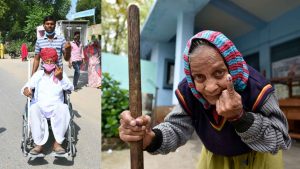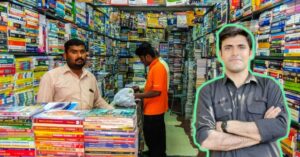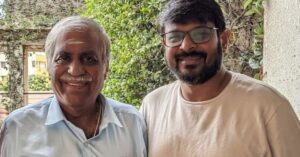She Showed How It Is Possible for ONE Girl to Transform an Entire Village through Education
Education was the last thing on the minds of Mallahipurva villagers. Especially for girls, who were considered as just extra hands to support the family. But one girl, Gudiya, fought all odds and became the first one in her village to pass Secondary School. She did not stop at just this. She started a school for other kids in her own house and made sure they embraced the gift of education too. This is how she brought about the transformation.
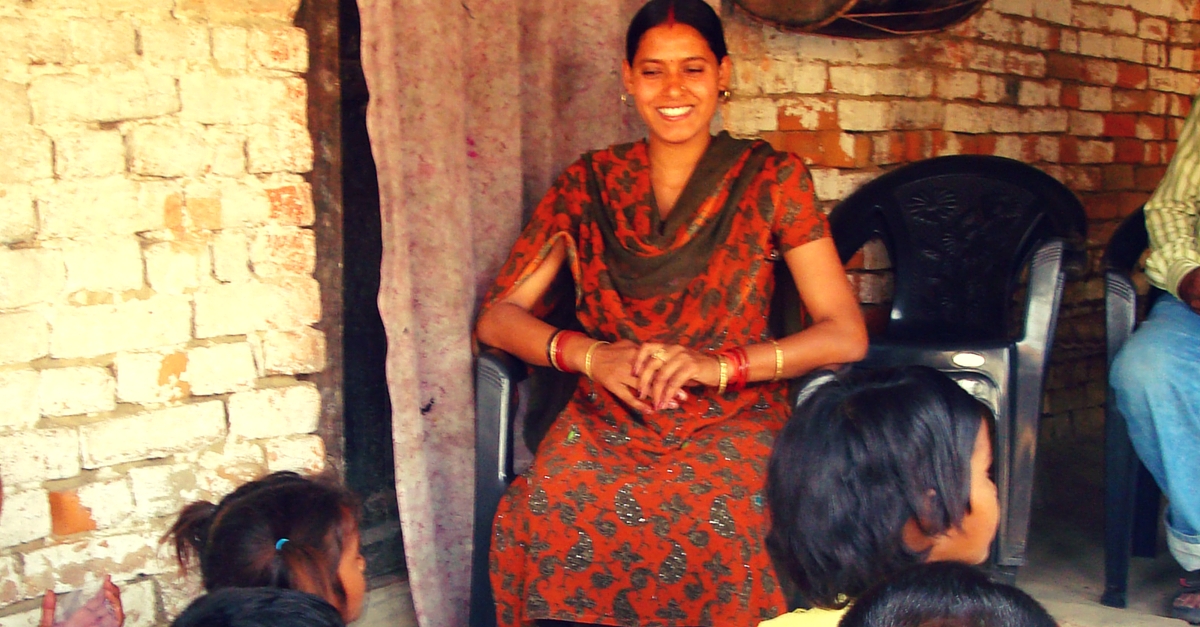
Education was the last thing on the minds of Mallahipurva villagers. Especially for girls, who were considered as just extra hands to support the family. But one girl, Gudiya, fought all odds and became the first one in her village to pass Secondary School. She did not stop at just this. She started a school for other kids in her own house and made sure they embraced the gift of education too. This is how she brought about the transformation.
Mallahipurva village, located 150 kilometres from Uttar Pradesh’s state capital, Lucknow, is a perfect example of neglect and deprivation. Dominated by the mallahas, an impoverished lower caste fishing community, education was the last thing that children here had access to and women were only seen as extra working hands to make fishing nets and munj (wild grass) ropes. An added curse was the rampant production and consumption of country liquor made from the abundant Mahua flowers of the region.
It’s here that Gudiya, who is now in her mid-twenties, ushered in change by establishing a small school a few years back. She says, “I grew up in an environment where girls had no hope of ever leading a respectful life; even their mothers were alcoholics. The village boys, too, saw no scope in building a future and took to drinking early and aimlessly whiling away their time. Life was really tough. Just to get a square meal a day my parents had to make all of us work.”
Then when the mid-day meal scheme started in a nearby school Gudiya was sent there just so she would get something to eat – at least her parents had one mouth less to feed.
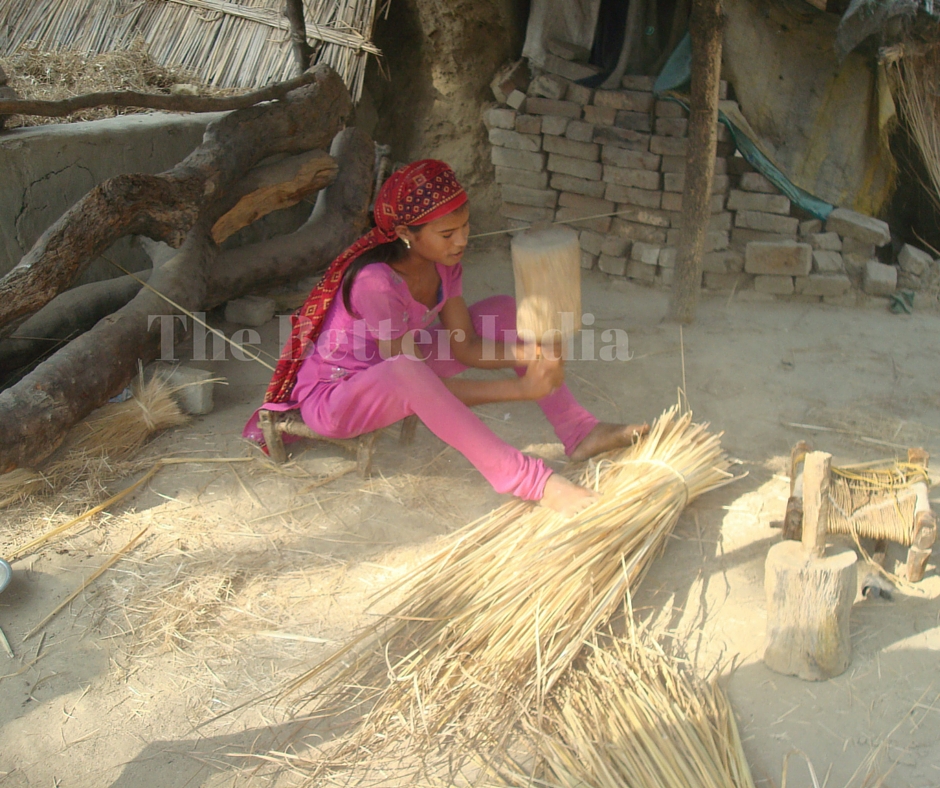
“That turned out to be a life changing decision. When I went to school, I realised what a wonderful thing education is and I decided to continue going to school,” she recalls.
Once her mind was made up, there was no turning back for this youngster, who hails from the only Brahmin family in her village and is one of 10 children – five girls and five boys. However, before going to school could be a regular thing she had to get her father, Babu Lal Sharma, to agree to her plan.
“It was not easy to convince my father. He had put me on the job of spinning the ‘munj’ ropes, which when sold got us some money to feed our family. But I didn’t back down and eventually he gave in,” she shares.
Gudiya paid for her schooling by making munj rope in her free time and her single-minded dedication was rewarded when she became the first girl in Mallahipurva to pass the Secondary School Certificate (SSC) exam in 2008.
Her father, Babu Lal, says, “I was tongue-tied when she told me the news and then gave the SSC certificate in my hand. It was a source of both happiness and apprehension for me. People in the village kept telling me that I was wrong in allowing her to do all this, but my heart said that this was her destiny, that she was meant to do this.”
But passing an examination was not Gudiya’s sole ambition. She had bigger plans – she wanted to start a small school for all those children who could not afford formal education right in her village.
When she gathered the courage to speak to the elders about it and requested that some dedicated space be given to her to run the school, they flatly refused. So she once again went to her father to seek permission to allow Mallaha children to come into their home.
Being Brahmins this was considered not only sacrilegious by her parents but was also expressly prohibited by local religious heads. Nevertheless, Gudiya managed to coax consent out of her parents and to take classes IN the family verandah.
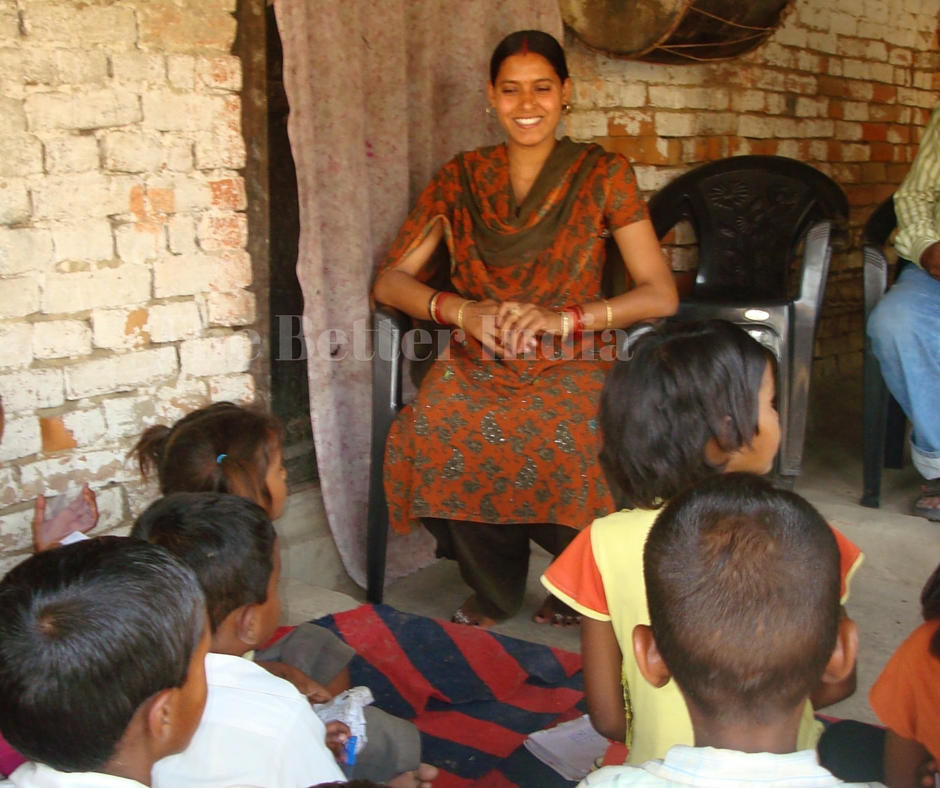
The next big hurdle she had to overcome was getting the children to actually come. With around 100-odd families living in Mallahipurva and almost all the parents being addicted to country liquor, motivating them to send their children to study was far from easy.
“I went from house to house collecting children and getting them to class. Their parents were not happy and resisted my entreaties, but I never gave up. Then when a scheme called Child to Child Education was introduced by the New Delhi-based social organisation, Girija Devi Foundation, I signed up for it and attached my school to it. They helped me get books, food and even medical aid, all free of cost, for all those who came to study. Owing to this, support from parents too began to grow,” elaborates the inspiring young educator.

Of course, Gudiya did not abandon her school even after she got married and moved to Kanpur. In fact, she continues to keep a tab on what’s happening at her school from a distance, having handed over the reins to her younger sister, Soni. “My sister has studied up to Class Eight and is handling the school very well,” she says with a smile.
This school has proved to be a great hit with the students, who quickly finish up their household chores and rush to Gudiya didi’s classes – they are still called that.
What makes this classroom doubly beneficial for the little ones is the fact that those suffering from medical problems can avail of immediate and free treatment, thanks to the added benefits of the Foundation’s education initiative.
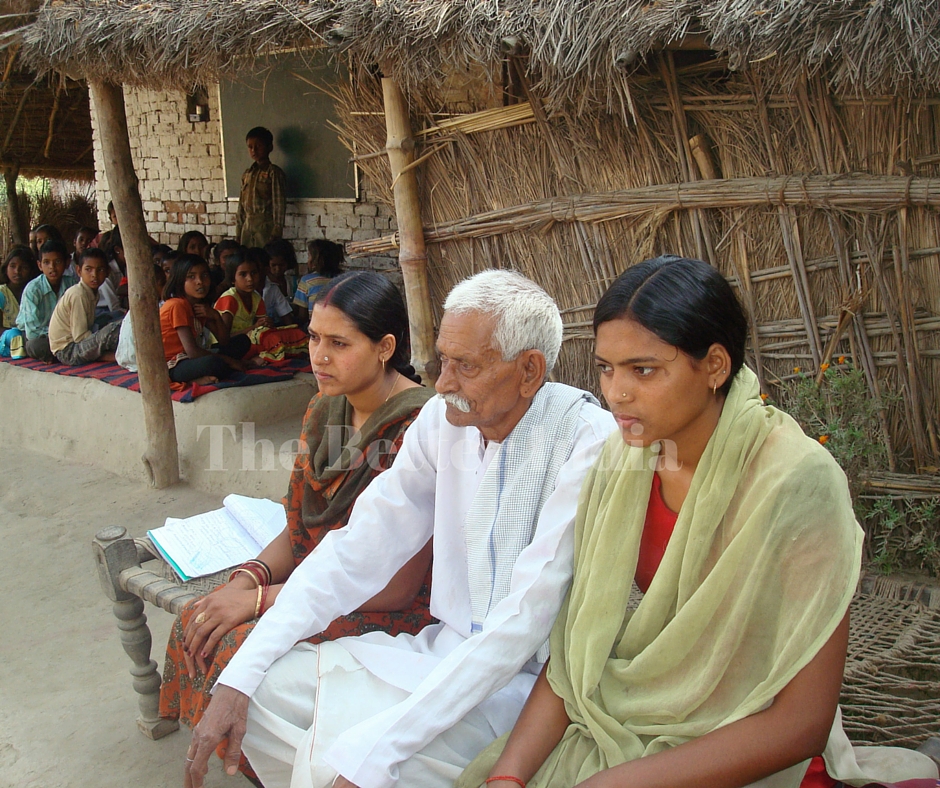
For instance, Nita, who is in her teens, has been able to get rid of her squint just because she joined Gudiya’s classes. She was 10 years old when she underwent an eye surgery through the medical aid provided for the children at the school. Indeed, according to Nita, Gudiya’s school has been a godsend. “Before the operation I had a squint and could not see very clearly. I used to overhear my mother tell my father that I would never get married because of the way I look and would have to work all my life spinning ropes and chopping fodder for the cattle. Then I joined school and during a medical check-up the doctor suggested an operation to correct the squint. These days, I can see and read properly and don’t feel shy about meeting people,” she says.
There are noticeable changes in the attitude of the local community as well. Says Gudiya, “In the beginning I had faced a lot of ridicule and hostility. Some even threatened me and my family, saying that I was ruining the established way of life in the village. The same people, however, are extending full support today. Earlier, the children were completely neglected – they would not eat food on time, wash or dress properly. There was a lack of sanitation that contributed to illnesses. Since both parents used to get drunk from the morning onwards, there was no one to take care of the kids. It’s a very different story presently. The children have learnt a lot and come to school neat and clean. They know how to take care of themselves and their siblings as well.”

Adds Nanhu, a former Pradhan of Mallahipurva, “The school has definitely made a difference. People still consume Mahua liquor but they have understood that their children should not do the same. Some have even started giving up their drunken ways and make sure to bring their children to the school at Gudiya’s home. I hope this change continues.”
Meanwhile, Gudiya has great hopes not just for herself but for her students, “I hope that one day each child from this school takes on the responsibility to teach others.” This young woman, who became a teacher almost by accident, has understood clearly the difference a dedicated teacher can make.
Like this story? Or have something to share? Write to us: [email protected], or connect with us on Facebook and Twitter (@thebetterindia).
This story made me
- 97
- 121
- 89
- 167
Tell Us More
We bring stories straight from the heart of India, to inspire millions and create a wave of impact. Our positive movement is growing bigger everyday, and we would love for you to join it.
Please contribute whatever you can, every little penny helps our team in bringing you more stories that support dreams and spread hope.






